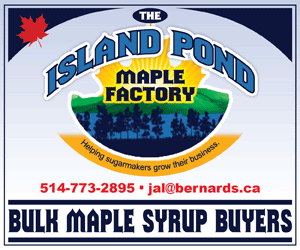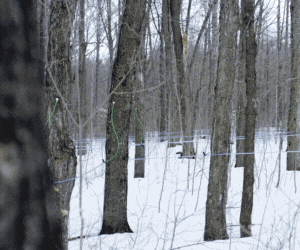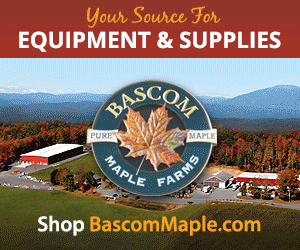Food Safety & Gov't Regulations
Gov't funds available for sugarmaker equipment upgrades
Sugarmakers encouraged to visit NRCS offices
By | JUNE 23, 2023
HARRISBURG, Pa.—USDA Natural Resource Conservation Service (NRCS) holds a magnitude of hidden gems to offer maple syrup producers.
For example, through our Technical Service Provider (TSP), NRCS can help develop both Energy Management Plans to identify areas of an operation that could become more efficient in cost of operation and time, and Forest Management Plans that inventory and alleviate resource concerns and are geared toward planning a strategy to create a healthier forest based on landowner goals.
To help in the implementation of the Energy Management Plan, NRCS’s Environmental Quality Incentives Program (EQIP) can provide cost share incentives where the incentive payment is proportionate with your operations size. Items include:
-Energy Efficient Hot Water Heaters,
-VFD’s for vacuum pumps
-Automatic Control Systems
-Reverse Osmosis machines
-Oil‐Fired Evaporators
-Wood‐Fired Evaporators
-Preheaters
Additionally, through the EQIP Program, NRCS can provide incentive payments for activities identified on the Forest Management Plan in wood lots and sugarbushes.
Some of the activities include Forest Stand Improvement which could include assistance with thinning or creating openings for wildlife, and pollinator habitat plantings and tree plantings.
Brush Management and Herbaceous Weed Control practices are also available to assist with invasive species and undesirable plant management.
NRCS’s Conservation Stewardship Program (CSP) is a program that helps to build on existing conservation while further enhancing the woodlot.
CSP is a common farmland program but is available in a forestry setting as well.
One enhancement available through CSP is Sugarbush Management where landowners receive annual payments for creating a more diverse and resilient woodlot by planting additional tree and bush species.
This practice removes the risks associated with monoculture forests.
Numerous other enhancements including pollinator habitat practices where a wildflower field can be created, creating biochar from woody residue after a woodlot thinning, planting riparian buffers and wildlife enhancements to name a few are available for your woodlots through CSP.
Contact your local USDA NRCS office for additional information. To find your local NRCS office, please go to www.nrcs.usda.gov/contact/find‐a‐service‐center .
NRCS can also help organic producers improve their operations or help producers transition to organic using a conservation plan tailored to their needs.
USDA’s Farm Service Agency (FSA) offers programs for syrup producers such as Farm Storage Facility Loans (FSFL) that offer low interest financing to go toward building or upgrading storage facilities.
Both Maple Sap and Maple Syrup are eligible for this financing opportunity that can be utilized for storage tanks, hauling trucks and storage space.
Loan amounts range from $50,000 to $500,000 under this program.
FSA and Risk Management Agency (RMA) also offer coverage to help protect against natural disasters with programs such as Federal Crop Insurance and Whole‐Farm Revenue Protection and the Tree Assistance Program to replant or rehabilitate trees due to natural disasters where eligible.
Please keep in mind that it is not the intent of NRCS to put someone in business or expand an existing business through taxpayer dollars but to increase the efficiency of existing production as well as alleviate environmental concerns and enhance your woodlots.
































